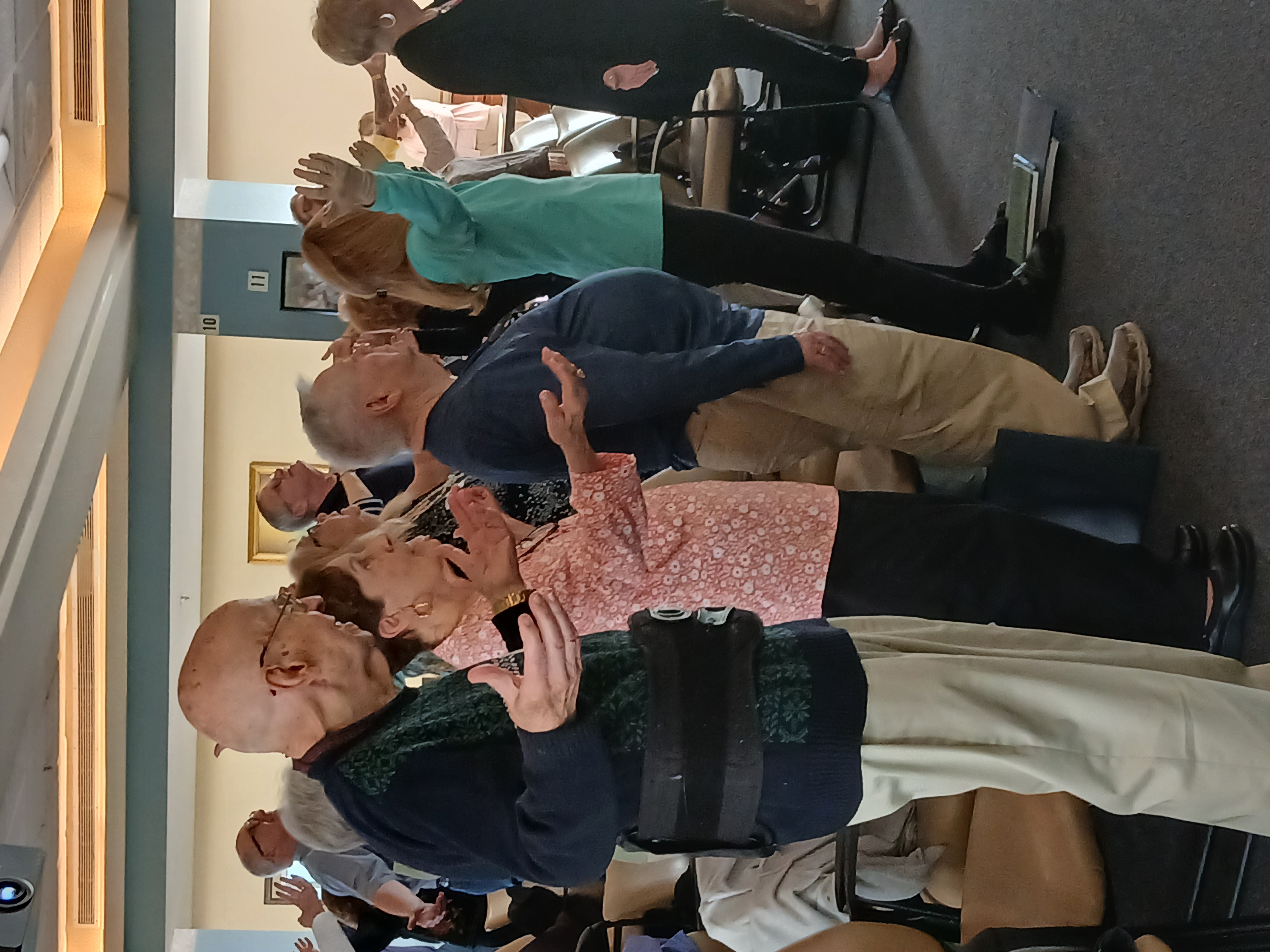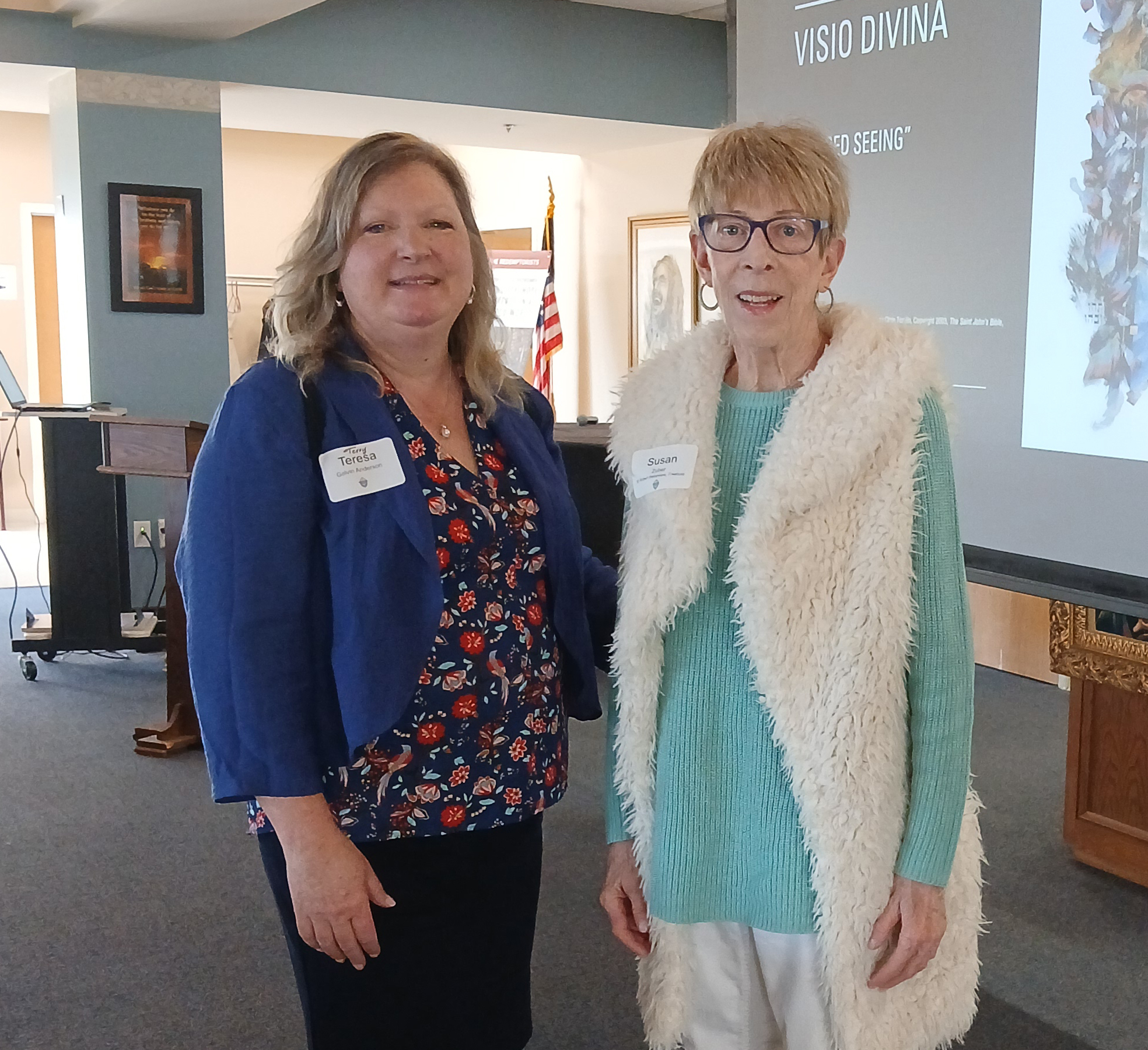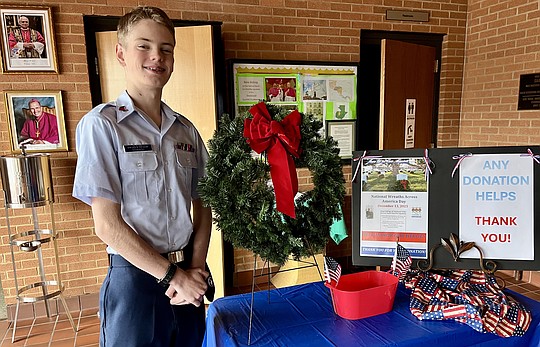Caregiver retreat an ‘informational and transformational’ experience
May 8, 2024 at 3:18 p.m.

 Attendees take part in an exercise called Upward in which they open themselves to God. Mary Morrell photo “Where are God’s fingerprints in your life?”
Attendees take part in an exercise called Upward in which they open themselves to God. Mary Morrell photo “Where are God’s fingerprints in your life?”
Retreat presenter Teresa Galvin Anderson posed the question to some 55 caregivers who had come to San Alfonso Retreat Center, Long Branch, May 1 for a Retreat for Caregivers, hosted by the diocesan Office of Pastoral Life and Mission.
Anderson, a Catholic chaplain, artist, and CLEM Mission Leader for Trinity Health, brought her creative spirit and intriguing art to the day, leading the attendees through a variety of prayer and reflection techniques for their own work of self-care.
The day included Mass, celebrated by Father John R. Bambrick, pastor, St. Aloysius Parish, Jackson; lunch and quiet time for caregivers to be renewed.
Words of Wisdom
Anderson helped attendees find the answer to her question by sharing the experiences in her life that led her to see God’s fingerprints on her own unique path, including her all encompassing joy and wonder in colors, which she continues to incorporate into her personal, spiritual and professional lives, and into the lives of those for whom she cares.
Anderson touched on topics such as “Life in Sacred Spirals,” and “A Child’s Religious Imagination Ignited,” and walked attendees through the process of “Visio Divina,” or sacred seeing, a form of prayer through reflection on art.
She pointed out that “many of us are made caregivers at an early age,” some at the birth of a sibling, and there’s a need to believe, as she did, “My first job is big sister.” Or the death of a parent, which leads children to feel the need to step into the parent’s role.
Anderson shared that at some point in her life she created physical permission slips for self-care to remind herself, and others, that “self- care is not an option,” it’s a necessity.
Gratefulness is also a self-care tool, she stressed, as it affects the spiritual and emotional states, making it easier to get through hard times by remembering even the smallest of God’s blessings, like “fresh blueberries, heat in the house, and a job.”
She exhorted listeners to a variety of practices, saying, “Turn to Scripture … have a sense of humor … walk in the pain … radiate hope and experience hope in doing something simple … create something … ponder how chaos leads to creation in your own life … and, finally, see the fingerprint of God in your life.”
Speaking From Experience
Susan Zuber, a parishioner in St. Rose of Lima Parish, Freehold, was in attendance at the retreat for reasons similar, in many ways, to those of other participants.
She is a caregiver. For her, it is her 93-year-old mom who struggles with dementia. It’s not her first time as a caregiver. She left her high-level career in Washington, D.C., after 30 years to move back to N.J.to help her mom care for her dad.
After her dad died in 2013, she stayed with her mom. They both realized “we needed each other,” said Zuber, who, after recovering from her own kidney transplant in 2018, became her mom’s caregiver when her mom had several strokes and developed dementia.
“The retreat Is a time of spiritual renewal in my caregiver journey. … Some days are hard. We have to be gentle with ourselves,” she said, noting the importance of self-care.
“You can get lost in the 24/7 of caregiving. … Today is a treat for me to be with like-minded people spiritually,” she stressed.
 Presenter Teresa Galvin Anderson, left, chats with retreat attendee, Sue Zuber, during a break. Mary Morrell photo
Presenter Teresa Galvin Anderson, left, chats with retreat attendee, Sue Zuber, during a break. Mary Morrell photoBarbara and Curt Muklevicz, members of St. Elizabeth Ann Seton Parish, Whiting, have had a 10-year journey of caregiving – for an older brother, and now a sister, both with some level of dementia – learning a lot along the way.
One of the biggest challenges in caregiving, said Barbara Muklevicz, who is a retired R.N., is knowing “how to focus on what is the next right thing to do. Is it something you want, or is it something that really needs to be done? We all have different roles we play … the key is being available.”
Curt Mulkevicz clarified, “You need to know when to step into the ring, and when to be an observer,” pointing out, “It means to pause a lot.”
The couple agreed that information is power and the retreat at San Alfonso, on the shore of the Atlantic Ocean, was both an informational and transformational experience for caretakers.
“Self-care is self-preservation,” said Curt Muklevicz. “You have to learn to set boundaries, which eventually works out well,” for the caregiver and receiver.
Related Stories
Monday, December 15, 2025
E-Editions
Events
 Attendees take part in an exercise called Upward in which they open themselves to God. Mary Morrell photo “Where are God’s fingerprints in your life?”
Attendees take part in an exercise called Upward in which they open themselves to God. Mary Morrell photo “Where are God’s fingerprints in your life?”
Retreat presenter Teresa Galvin Anderson posed the question to some 55 caregivers who had come to San Alfonso Retreat Center, Long Branch, May 1 for a Retreat for Caregivers, hosted by the diocesan Office of Pastoral Life and Mission.
Anderson, a Catholic chaplain, artist, and CLEM Mission Leader for Trinity Health, brought her creative spirit and intriguing art to the day, leading the attendees through a variety of prayer and reflection techniques for their own work of self-care.
The day included Mass, celebrated by Father John R. Bambrick, pastor, St. Aloysius Parish, Jackson; lunch and quiet time for caregivers to be renewed.
Words of Wisdom
Anderson helped attendees find the answer to her question by sharing the experiences in her life that led her to see God’s fingerprints on her own unique path, including her all encompassing joy and wonder in colors, which she continues to incorporate into her personal, spiritual and professional lives, and into the lives of those for whom she cares.
Anderson touched on topics such as “Life in Sacred Spirals,” and “A Child’s Religious Imagination Ignited,” and walked attendees through the process of “Visio Divina,” or sacred seeing, a form of prayer through reflection on art.
She pointed out that “many of us are made caregivers at an early age,” some at the birth of a sibling, and there’s a need to believe, as she did, “My first job is big sister.” Or the death of a parent, which leads children to feel the need to step into the parent’s role.
Anderson shared that at some point in her life she created physical permission slips for self-care to remind herself, and others, that “self- care is not an option,” it’s a necessity.
Gratefulness is also a self-care tool, she stressed, as it affects the spiritual and emotional states, making it easier to get through hard times by remembering even the smallest of God’s blessings, like “fresh blueberries, heat in the house, and a job.”
She exhorted listeners to a variety of practices, saying, “Turn to Scripture … have a sense of humor … walk in the pain … radiate hope and experience hope in doing something simple … create something … ponder how chaos leads to creation in your own life … and, finally, see the fingerprint of God in your life.”
Speaking From Experience
Susan Zuber, a parishioner in St. Rose of Lima Parish, Freehold, was in attendance at the retreat for reasons similar, in many ways, to those of other participants.
She is a caregiver. For her, it is her 93-year-old mom who struggles with dementia. It’s not her first time as a caregiver. She left her high-level career in Washington, D.C., after 30 years to move back to N.J.to help her mom care for her dad.
After her dad died in 2013, she stayed with her mom. They both realized “we needed each other,” said Zuber, who, after recovering from her own kidney transplant in 2018, became her mom’s caregiver when her mom had several strokes and developed dementia.
“The retreat Is a time of spiritual renewal in my caregiver journey. … Some days are hard. We have to be gentle with ourselves,” she said, noting the importance of self-care.
“You can get lost in the 24/7 of caregiving. … Today is a treat for me to be with like-minded people spiritually,” she stressed.
 Presenter Teresa Galvin Anderson, left, chats with retreat attendee, Sue Zuber, during a break. Mary Morrell photo
Presenter Teresa Galvin Anderson, left, chats with retreat attendee, Sue Zuber, during a break. Mary Morrell photoBarbara and Curt Muklevicz, members of St. Elizabeth Ann Seton Parish, Whiting, have had a 10-year journey of caregiving – for an older brother, and now a sister, both with some level of dementia – learning a lot along the way.
One of the biggest challenges in caregiving, said Barbara Muklevicz, who is a retired R.N., is knowing “how to focus on what is the next right thing to do. Is it something you want, or is it something that really needs to be done? We all have different roles we play … the key is being available.”
Curt Mulkevicz clarified, “You need to know when to step into the ring, and when to be an observer,” pointing out, “It means to pause a lot.”
The couple agreed that information is power and the retreat at San Alfonso, on the shore of the Atlantic Ocean, was both an informational and transformational experience for caretakers.
“Self-care is self-preservation,” said Curt Muklevicz. “You have to learn to set boundaries, which eventually works out well,” for the caregiver and receiver.










